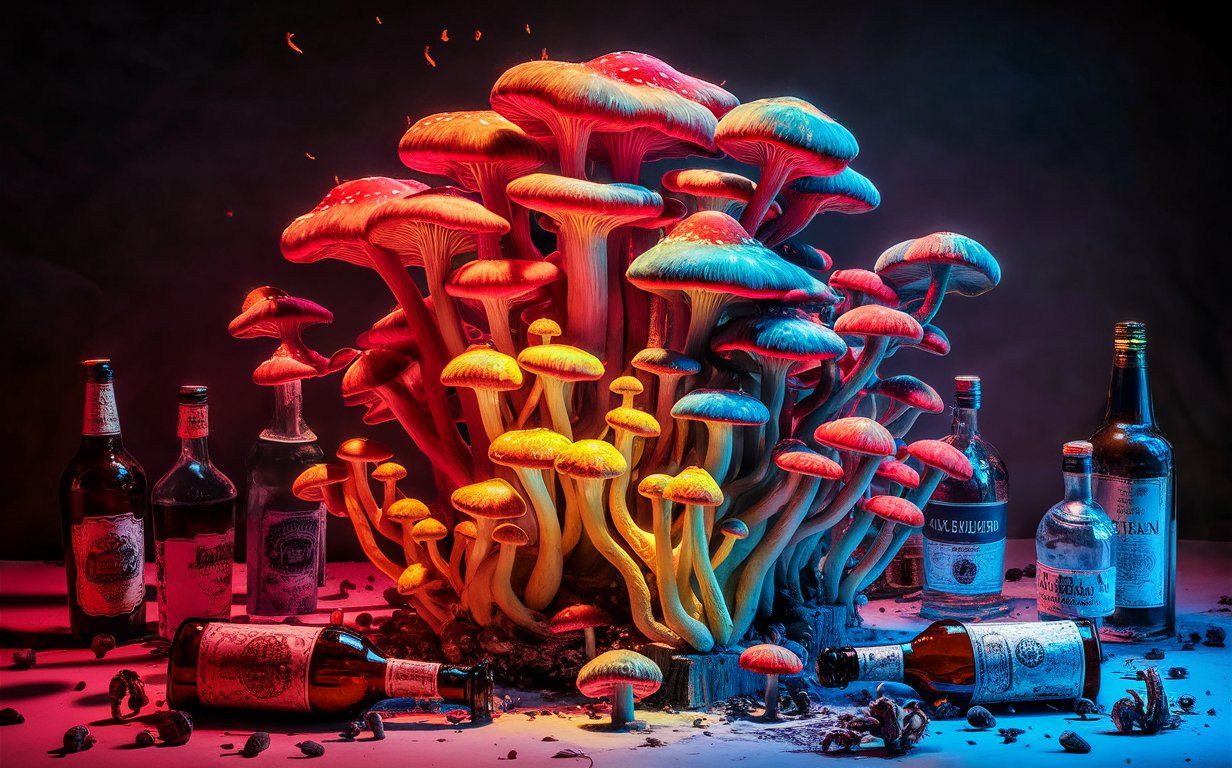Follow us on Google News (click on ☆)
Published in the scientific journal Brain, their work confirms the potential of psilocybin to combat alcohol addiction, shedding light on the previously unknown mechanisms of this molecule. This is a very promising scientific breakthrough to tackle the scourge of alcohol addiction with psychedelics.

Psilocybin reduces alcohol self-administration by selective activation of the left nucleus accumbens
The study conducted by Inserm and UPJV scientists shows that administering psilocybin in mouse models of alcohol addiction halves their alcohol consumption. These data validate the interest in studying this molecule for alcohol dependence treatment.
To explain these effects and better understand the underlying mechanisms, the researchers measured the expression of certain genes in the brain's nucleus accumbens, known to be involved in alcohol addiction. The nucleus accumbens plays a key role in addiction by mediating the pleasurable effects of drugs and the motivation to consume them.
Surprisingly, the results reveal a cerebral lateralization in the effects of psilocybin, with gene expression modified differently on the left and right sides of the brain, either increasing or decreasing.
These initial findings prompted researchers to explore the specific role of the left or right nucleus accumbens by directly injecting psilocybin into either the left or right nucleus accumbens.
Psilocybin injected into non-alcohol-consuming rats induces particular changes in the brain, notably a decrease in the expression of 5HT-2A serotonin receptors only in the left nucleus accumbens. Unexpectedly, the increased expression of the BDNF gene, associated with brain plasticity, was observed only in the right nucleus accumbens.
When psilocybin is injected directly into the left nucleus accumbens, it halves alcohol consumption, but it has no effect when injected into the right nucleus accumbens.
A deeper understanding of the mechanism behind psilocybin's beneficial effects on alcohol consumption
The team of Professor Naassila further delved into the biological mechanism of psilocybin. It is known that the hallucinogenic effects of psilocybin are linked to its action on serotonin 5-HT2A receptors. In this study, researchers found that these receptors were overexpressed after treatment with psilocybin. To definitively show that psilocybin's effects on alcohol consumption are related to a specific effect on serotonin 5-HT2A receptors, they tested the effect of blocking these receptors.
Indeed, the infusion of ketanserin, a blocker of 5HT-2A receptors, directly into the left nucleus accumbens prevents psilocybin from reducing alcohol consumption. Blocking these receptors in the right nucleus accumbens, however, is ineffective.
The study also highlights another potential mechanism well-known in addiction. Administering psilocybin increases the expression of dopamine D2 receptors in the nucleus accumbens of alcohol-consuming rats. It is already known that in alcohol addiction, a decrease in D2 receptor expression is observed in animals and humans. These results could explain how psilocybin counters addiction mechanisms by restoring the expression of these receptors.
This unprecedented discovery concerning the lateralization of psychedelic effects in treating alcohol addiction opens new research avenues. Next steps: create a more precise map of this lateralization and verify if it applies to other psychedelics (LSD, DMT...).
According to Professor Mickael Naassila: "These results are very original because they demonstrate that psilocybin acts differently on gene expression depending on the brain hemisphere. And in the brain, it is particularly the nucleus accumbens, specifically in the left hemisphere, that seems implicated in the effects of reducing alcohol consumption."